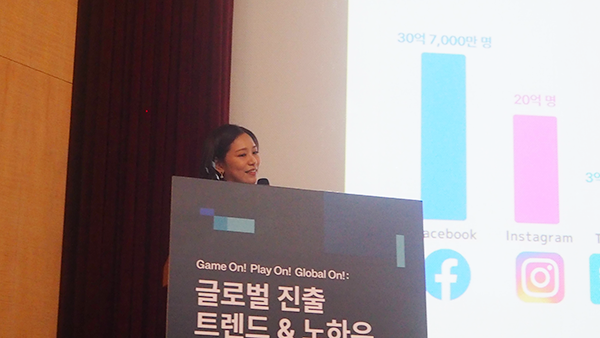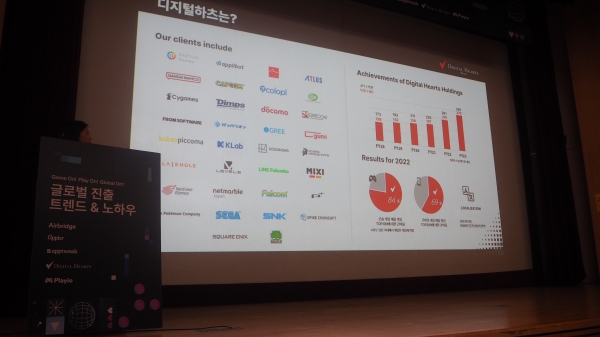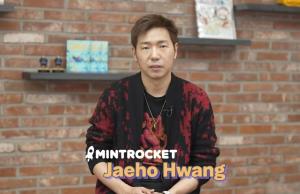On March 28, 2023, a global marketing seminar titled "Game On! Play On! Global On!: Global Expansion Trends and Know-How" was held at Gangnam POSCO Tower, Yeoksam. Eunji Ryu, CMO (Chief Marketing Officer) of Digital Hearts Seoul, gave a lecture on the topic of "Navigating Through Japanese Marketing, Reasons, and Methods Based on Case Studies."
Established in Japan in 2001, Digital Hearts initially focused on game debugging and expanded its services in line with the growth of the Japanese gaming industry. Today, it offers comprehensive global support, including QA, localization/LQA, customer service (CS), development outsourcing, security, and personnel dispatch.
 |
| Digital Hearts Seoul, Eunji Ryu, CMO |
Having a workforce of around 8,500 employees exclusively dedicated to the gaming sector in Japan, Digital Hearts is a major player in the industry. Currently, the company is enhancing its marketing endeavors by leveraging its powerful proprietary media. Furthermore, it continues to expand its reach into new territories, including the IP media mix and Web3 domains.
While Bishōjo games are typically favored in Japan, there are also games considered unlikely to succeed that still maintain a competitive edge. Eunji Ryu, CMO, expressed, "Japan is remarkably receptive to gaming. With adept research on user engagement strategies, favorable outcomes are attainable."
The reasons to tackle the Japanese market are evident. Ranked third globally in revenue, following only the United States and China, Japan shows a revenue difference of roughly five times that of South Korea. Furthermore, the Revenue Per Download (RPD) is approximately double that of South Korea. The Japanese market distinguishes itself by consistently generating revenue across various game rankings, unlike the South Korean market, where revenue is concentrated in a small number of top-ranking games.
 |
In Korea, the majority of revenue comes from the top 5 games. In contrast, revenue in Japan is more evenly spread across games, including those outside the top 5. As a result, the decline in revenue relative to ranking is less steep in Japan compared to Korea. Consequently, games ranked beyond 200th in revenue can still anticipate stable revenue in Japan.
 |
Korea and Japan have different revenue timelines. In Korea, a game's success or failure can be determined within three months of its release. In contrast, Japan's response is more gradual, with some games taking up to two years and eight months to reach peak revenue. Eunji Ryu, CMO, advised against giving up on a game prematurely based on its performance within the first three months in Japan.
Japan is known for having a large number of games that maintain long-term services of over five years, making it a market where substantial revenue can be expected over extended periods. Similar to Korea, Japan has also seen games that achieved significant early success, often by utilizing renowned intellectual properties (IP). IP serves as one of the methods to expedite monetization in Japan. Notably, these games have generated revenue exceeding sevenfold, despite having lower download figures compared to Korea.
 |
Eunji Ryu, CMO, highlighted the differences between the Korean and Japanese markets, explaining, "In Korea, competition is the primary driver, leading to rapid monetization as players strive to gain an edge. In contrast, Japan emphasizes nurturing and collecting, resulting in a more cautious approach to monetization and delayed revenue generation as players carefully evaluate growth and collection-based content."
 |
Eunji Ryu, CMO, shared her observations from meetings with gaming companies in the past year, stating, "Many companies rely on translation tools for customer service responses." She highlighted the importance of providing high-quality CS in Japan, as translated responses can potentially offend or inconvenience customers.
Japan is renowned as a "manual-oriented country," where even minor tasks are guided by manuals. This reliance on manuals permeates the gaming sphere, with manuals serving as indispensable strategy guides. Notably, even idle games in Japan provide strategy wikis, which are critical for players to determine where to allocate their in-game purchases.
She also touched on Japan's approach to handling tasks. Contrary to Korea's "hurry-hurry" culture, Japan prioritizes the process. Japanese people prefer to execute tasks properly and follow familiar paths. This characteristic also applies to game services in Japan, suggesting that developers should allocate more time for preparation.
To thrive in the Japanese market, game developers must adopt an approach that minimizes resistance, improves discoverability, and cultivates a robust community.
Moreover, Japan seamlessly integrates animation into diverse fields, such as pharmacy advertisements as well as Cup Noodle. Eunji Ryu, CMO, attributed the use of animation to its ease in conveying emotions. She emphasized that expressing emotions through animation is quicker and more effective than human acting, underlining the significance of effectively conveying feelings of preference or aversion.
 |
In Japan, there is a 35% likelihood of downloading an app after viewing an advertisement. And 65% of downloads occur immediately after a search. Notably, unlike Korean companies that predominantly advertise on Google Play, in Japan, the iOS platform holds greater prominence.
김태만 기자 ktman21c@gamevu.co.kr
<저작권자 © 게임뷰, 무단 전재 및 재배포 금지>

 넷마블, '나 혼자만 레벨업: 어라이즈' 체험기
넷마블, '나 혼자만 레벨업: 어라이즈' 체험기




![[현장] 김형태 대표 여의도에 강하! 시프트업 ‘스텔라 블레이드’ 행사](/news/thumbnail/202404/32567_86823_5854_v150.jpg)
![[포토] 카카오게임즈 '아키에이지 워', 대만 쇼케이스 성료](/news/thumbnail/202404/32529_86732_3127_v150.jpg)
![[포토] '오버워치 챔피언스 시리즈(OWCS)' 아시아 본선에 나서는 한국팀들](/news/thumbnail/202404/32461_86464_3811_v150.jpg)
![[포토] X-PLANET, 첫 단독 팬미팅 앞둔 ‘후뢰시맨’ 배우 입국 현장](/news/thumbnail/202404/32440_86387_5027_v150.jpg)



